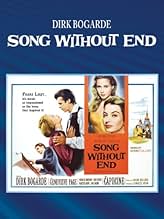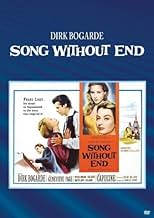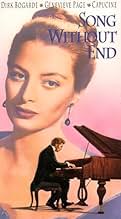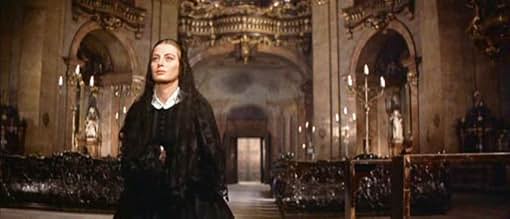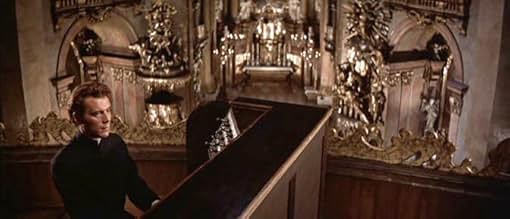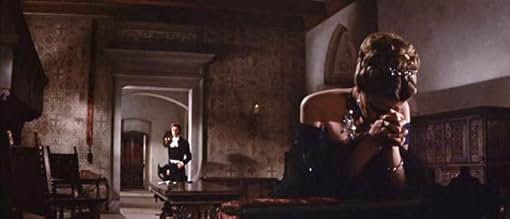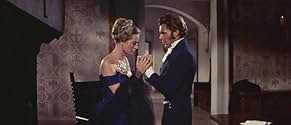Agrega una trama en tu idiomaThe romantic story of Hungarian pianist Franz Liszt (Sir Dirk Bogarde), whose scandalous love affair forced him to abandon his adoring audiences.The romantic story of Hungarian pianist Franz Liszt (Sir Dirk Bogarde), whose scandalous love affair forced him to abandon his adoring audiences.The romantic story of Hungarian pianist Franz Liszt (Sir Dirk Bogarde), whose scandalous love affair forced him to abandon his adoring audiences.
- Dirección
- Guionistas
- Elenco
- Ganó 1 premio Óscar
- 2 premios ganados y 3 nominaciones en total
- Thalberg
- (as E. Erlandsen)
- Chopin
- (as Alex Davion)
- Emissary
- (escenas eliminadas)
- Audience Member
- (sin créditos)
- Komparsenrolle
- (sin créditos)
- Dirección
- Guionistas
- Todo el elenco y el equipo
- Producción, taquilla y más en IMDbPro
Opiniones destacadas
The set decorations here are phenomenal, they're on par with the great 1944 film "Wilson."
The music is magnificent although we could have done without knowing about the friendship between Liszt and the anti-Semite Richard Wagner. Another flaw is the miscasting of Lou Jacobi as Bogarde's manager. Jacobi sounded like he came out of the Catskills. This film for Jacobi came after his super performance, the year before, in the beloved "The Diary of Anne Frank." (Happy Birthday Lou as you turn 95 on Dec. 28th.)
The first part of the film deals with Liszt's career. His playing in concerts in various European countries was remarkable. The second part deals with his ill-fated love with the Countess Cathryne of Lichtenstein.
While we see that Liszt entered the priesthood when his proposed marriage to Cathryne was rejected, we really can't tell if Cathryne became a nun. I imagine no since she was still technically married in the eyes of the church. Nonetheless, we have a powerful, beautifully acted film. Too bad that Totentanz, a Liszt masterpiece, was not played here. I had to know that piece of grand music in a required music course at college. Like the movie, Totentanz was a masterful piece.
The film only covers part of Liszt's life and concentrates (naturally) on the turmoil in his love affairs, which leads to his attempt to marry the already married Princess Carolyne Wittgenstein; he left his married girlfriend, Countess Marie D'Agoult, the mother of his children for her. (One of his daughters, Cosima, married Richard Wagner, who features in this film.) I disagree with a previous comment complaining about the way Liszt is portrayed. While it's not emphasized, it is obvious that he was a man of great charity, donating many of his fees to various organizations, and playing many benefit concerts. Later on, he concentrated on composing, at which he was very successful. As a performer, Liszt was a bona fide rock star in his day, complete with hysterical fans. He was most certainly attractive to women and religiously conflicted.
Dirk Bogarde does a sensational job as Liszt. This and "The Angel Wore Red" were his only Hollywood films. Even if they had been successful, it's doubtful Bogarde would have stayed in the states, as he probably wouldn't have been cast in the kinds of films he wanted to make and/or the kinds of parts he wanted to play. He makes a very romantic, intense Liszt, and his fingerings are nothing short of amazing. Capucine is good, if a little wooden, as Carolyne. The supporting cast is very good.
The production and costumes are opulent, but they are dwarfed by the music. Definitely some of the most brilliantly performed classical music in film.
Highly recommended for classical music lovers.
Charles Vidor's "Song Without End" (finished by George Cukor after Vidor died during production) looks at a period of Liszt's life. It sounds as though his scandalous personal life became as famous as his music. Sure happens with a lot of musicians.
Anyway, Dirk Bogarde plays Liszt, and Capucine plays the princess with whom he fell in love. Their love affair was what you might expect (but make no mistake, Capucine was a real babe). However, my interpretation of this movie got colored by the use of the music in cartoons. Richard Wagner is a character in the movie, and we hear the Pilgrims' Chorus from Wagner's Tannhäuser; I recognized the tune from the scene in Chuck Jones's "What's Opera, Doc?" where Bugs dresses as a Rhinemaiden to fool Elmer. I bet that my generation learned most of the high-brow culture (opera and literature) from the Looney Tunes without knowing that it was a spoof.
Anyway, it's an OK movie, not great. I guess that you could put it on your, ahem, Liszt of movies to see.
I will always remember that performance of ' Les Prelues'as being the most powerful that I have ever heard even from the best symphony orchestras.The performances of the late Jorge Bolet are magnificent.Especially during the clever arrangement of the Concerto/Hungarian Fantasia. It is clear that Dirk Bogarde is not playing the piano,yet one cannot help but take pleasure in the greatness of the music whomever is playing.
The producer of the film also takes great pains in letting the audience know that Franz Liszt often performed the music of other composers like Wagner and Berlioz.He also was a great fan of Chopin. This is addressed in the film with care and intelligence.
I remember this film as a child and can still remember the great music.Thank God! for the score from Song Without End.
I was expecting a comprehensive presentation of Liszt in a film devoted to his life and creative work. Less of interest were works by Bach, Beethoven, Mozart and others. The results looks like the film makers may have lacked complete confidence that a movie featuring compositions exclusively by Liszt would be that attractive to viewers.
In the event that's the case, it's no wonder the critical and public rating of this film is less than excellent. What's notable about it is the exquisite piano performance of Jorge Bolet on the soundtrack, the rich cinematography of James Wong Howe, and the flavorful performances by a talented cast headed by Dirk Bogarde.
¿Sabías que…?
- TriviaCharles Vidor had completed about 15 percent of this movie when he died of a heart attack on June 4, 1959. Sir Dirk Bogarde later recalled that he was "secretly relieved" by Vidor's death, since he and his co-star, Capucine had been treated badly by the short-tempered director. Vidor would often scream at Capucine to relax, and at one point, Bogarde recalled, "shook her like a dead cat." Vidor was replaced by George Cukor, who got along much better with his stars, and was more of an "actor's director."
- ErroresGrand Duchess make reference to "Ukraine" in one scene. The term was not in wide use in the 1840s, especially not among Russian nobility.
- Citas
Countess Marie: I met Franz at a musical party. I remember he played a ballade in A-flat major by Chopin. I thought I'd never seen anything as beautiful as Franz looked when he sat at the piano. I... I wanted to cry. He watched me as he played; Franz never fails to notice a pretty woman in his audience. Afterward, he followed me into the hall. I remember he said, "May I escort you somewhere, madame?" And I said, "Yes." And he said, "Where?" And I said, "Paradise." He didn't smile - he said, "I'll call a carriage."
Princess Carolyne: Did he?
Countess Marie: What?
Princess Carolyne: Drive you there - to paradise?
Countess Marie: [a pause, and a meaningful look as she turns to leave the room] He doesn't know the road, madame.
- ConexionesFeatured in Film Profile: Dirk Bogarde (1961)
Selecciones populares
- How long is Song Without End?Con tecnología de Alexa
Detalles
- Tiempo de ejecución
- 2h 21min(141 min)
- Relación de aspecto
- 2.35 : 1


